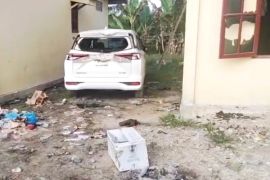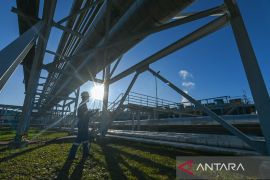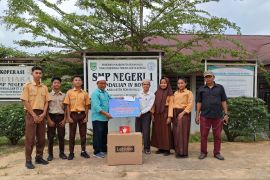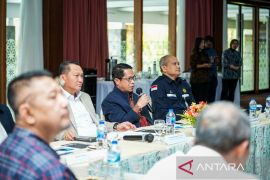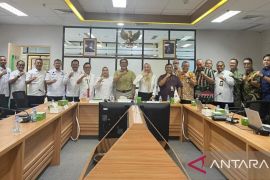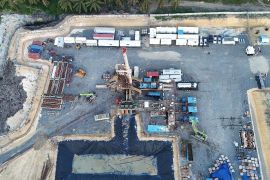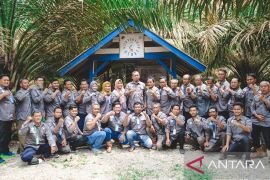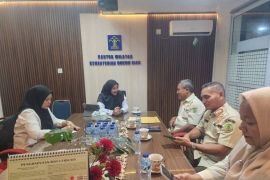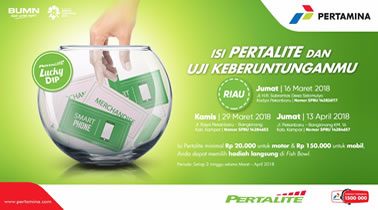
Rokan Block transfer, historic milestone ahead of 76th Independence Day
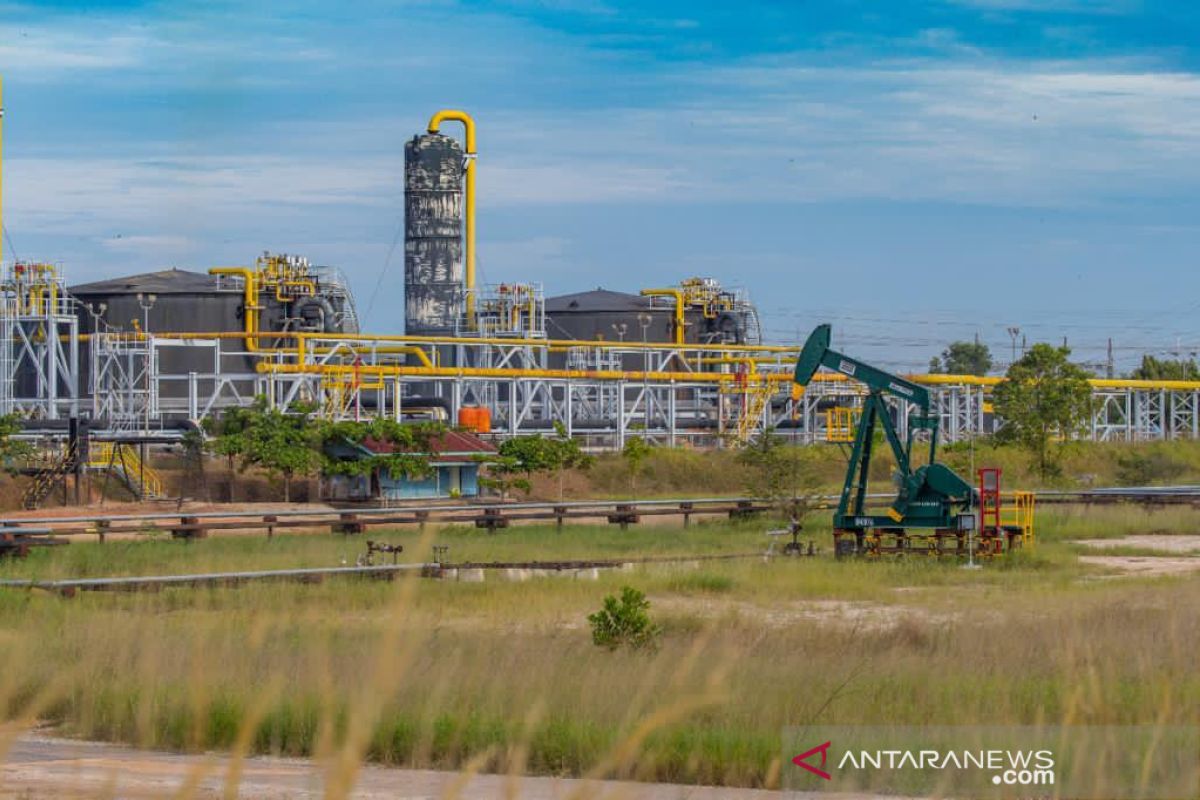
Jakarta (ANTARA) - A new history has been made in oil exploration in Indonesia just a week prior to the nation's Independence Day.
At 12:01 a.m. Western Indonesia Time (UTC +7) on Monday (August 9, 2021), Rokan Block in Riau province was officially handed over by PT Chevron Pacific Indonesia to PT Pertamina Hulu Rokan, a subsidiary of state-owned oil company PT Pertamina.
This historic exchange indicates that Indonesia is in complete control of one of the most productive oil fields in the country, operated by US company Chevron for the past 97 years.
Welcoming the start of Indonesian operatorship of the Rokan Block, Pertamina CEO Nicke Widyawati declared the handover a gift for the country, just a week before the 76th anniversary of its Independence Day.
"On this night, exactly at 12 a.m. Western Indonesia Time, August 9, we witness a historic moment in the exact month of our country's Independence day anniversary," Widyawati remarked.
A transitional team has been formed to oversee daily activities at the newly acquired block, he informed.
The transitional team will oversee subsurface and production operations, project and facility engineering, HCE operations, as well as human resources, financial and commercial aspects, supply chain management, and IT aspects essential for daily activities of oil exploration in the block, he said.
From 1951 until 2021, more than 11 billion barrels of oil have been produced in the Rokan Block, with average daily output pegged at 160.5 thousand barrels as of July 2021, equivalent to 24 percent of the national oil production, he added. Besides oil, around 41 million standard cubic feet per day of natural gas has also been produced at the same block, he continued.
Pertamina plans to drill 161 new oil wells by the end of 2021 and 500 new wells in 2022, Widyawati said. The exploration of new wells is supported by 16 drilling rigs, with 29 additional rigs used for workover and well services, mirroring the prior contract, he added.
Rokan Block, which spans 6,453 square kilometers, has ten main fields -- Minas, Duri, Bangko, Bekasap, Balam South, Kotabatak, Petani, Pematang, Petapahan, and Pager.
How the transfer unfolded
The transfer of the Rokan Block from Chevron to Pertamina did not happen overnight. The government took two years to prepare a proper transfer process, as the Rokan Block transfer was meant to serve as a litmus test for the transfer of other oil fields in the future.
Through the Energy and Mineral Resources Ministry Decision No. 1923K/10/MEM/2018 on August 6, 2018, the government appointed Pertamina subsidiary Pertamina Hulu Rokan as the operator of the Rokan Block after August 8, 2021, with 100 percent participation rights, including 10 percent rights to be offered to the Regional Administrative-owned Company (BUMD).
A cooperation contract for Rokan Block administration was signed between Pertamina Hulu Rokan and the Upstream Oil and Gas Regulatory Special Task Force (SKK Migas) on May 9, 2019.
With a gross-split profit-sharing scheme effective from August 2021 until 2041 and agreed on by the two companies, Pertamina said it is targeting to generate revenue for the country through the 48-percent gross split scheme.
After successfully retrieving the Rokan Block, the state has received a US$784 million bonus besides a potential of US$57 billion expected revenue and a firm commitment valued at US$500 million.
SKK Migas oversaw the handover process over two years and earlier initiated a Head of Agreement (HoA), which guaranteed Chevron Pacific Indonesia's investment at the conclusion of the working contract.
From the date of the signing of the agreement on September 29, 2020 until August 8, 2021, Chevron has drilled 103 new oil wells on the Rokan Block.
Besides the oil well drilling, SKK Migas has also paid attention to other factors for a successful transfer, which include operation and data migration, procurement of chemical EOR, management of operational contracts, procurement of electrical supplies and labour, transfer of IT, operation permits, and environment control.
Minister of Energy and Mineral Resources Arifin Tasrif urged Pertamina to remain steadfast in its commitment to maintain and improve natural oil and gas production in Rokan Block.
"This should be the Pertamina's main commitment because Rokan Block is the largest and most strategic oil field in Indonesia. Rokan Block is essential to fulfilling our one million barrel oil production daily target and 12 billion standard cubic feet per day for the natural gas production (BSCFD) in 2030," he stated.
Farewell, Chevron
By handing over the Rokan Block control to Pertamina, PT Chevron Pacific Indonesia has ceased to operate the block as of August 8, 2021, after controlling the oil field for almost a century.
Chevron's operations on the block commenced with the arrival of four geologists employed by Standard Oil of California to Kalimantan and Sumatra to explore potential oil fields in the region in March 1924.
After a fruitless endeavor of almost 15 years, the discovery of oil in Duri fields in 1941 and Minas fields in 1944 turned the fortunes of the company, which commenced oil exploitation in the region in 1951. The Rokan Block reached its highest production rate of one million barrels per day in 1973.
President director of Chevron Pacific Indonesia, Albert Simanjuntak, expressed his gratitude to the Indonesian government for allowing the company to operate in Rokan Block for 97 years and successfully turning the block into the largest oil field in Indonesia.
"We wish to thank the Indonesian government for allowing our company to operate in the Rokan Block for almost a century," Simanjuntak remarked.
With the transfer, Pertamina Hulu Rokan will officially operate the block for at least 20 years. Rokan Block will become the mainstay of Indonesia to accelerate crude oil production to reach the daily production target of 1 million barrels of oil and 12 billion standard cubic feet of natural gas production in 2030.
Indonesia's endeavor to meet the target is part of a greater mission to improve national energy resilience and efficiency and reduce dependence on imported commodities.
The successful transfer of Rokan Block to Pertamina is expected to create a domino effect and stimulate regional and national economic growth.
Pewarta : Sugiharto P, Nabil Ihsan
Editor:
Riski Maruto
COPYRIGHT © ANTARA 2026

